人教版(2019)选择性必修 第三册Unit 2 Healthy Lifestyle Using Language(1)—Listening and Speaking 课件(共19张PPT)
文档属性
| 名称 | 人教版(2019)选择性必修 第三册Unit 2 Healthy Lifestyle Using Language(1)—Listening and Speaking 课件(共19张PPT) | 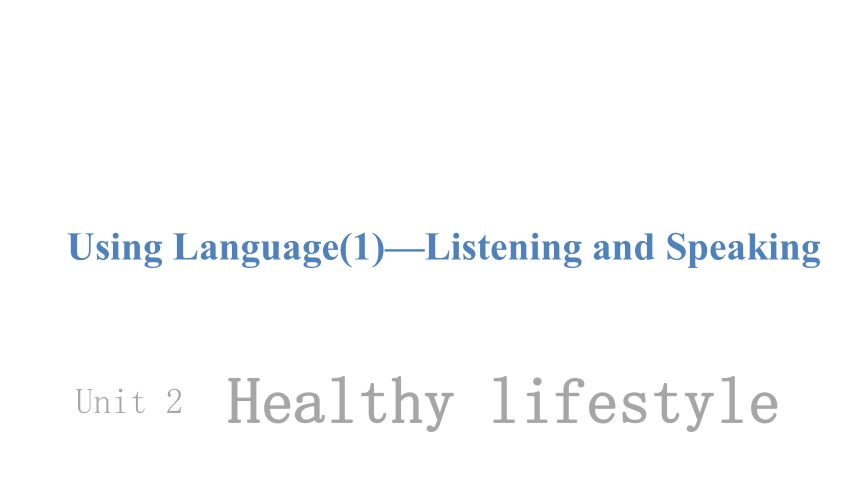 | |
| 格式 | pptx | ||
| 文件大小 | 17.1MB | ||
| 资源类型 | 教案 | ||
| 版本资源 | 人教版(2019) | ||
| 科目 | 英语 | ||
| 更新时间 | 2024-04-08 19:39:51 | ||
图片预览

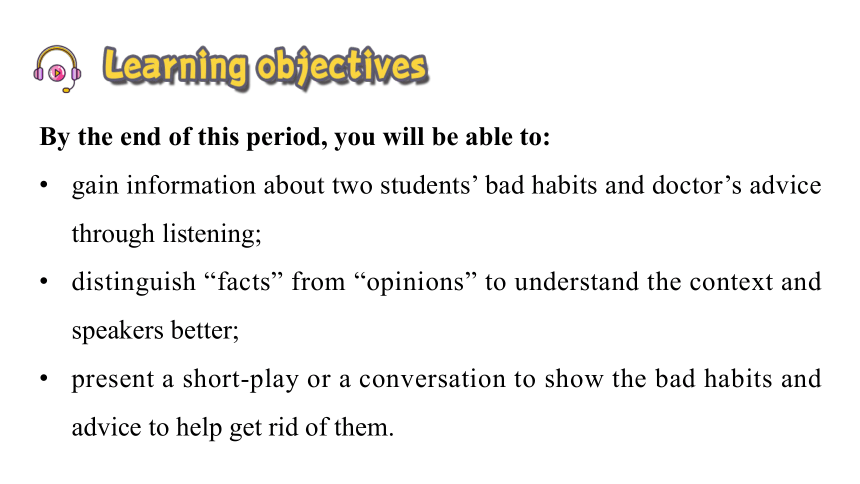
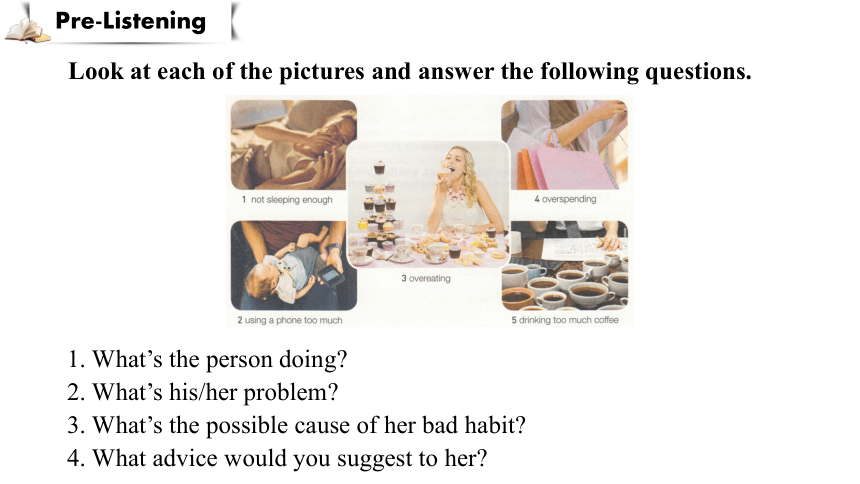
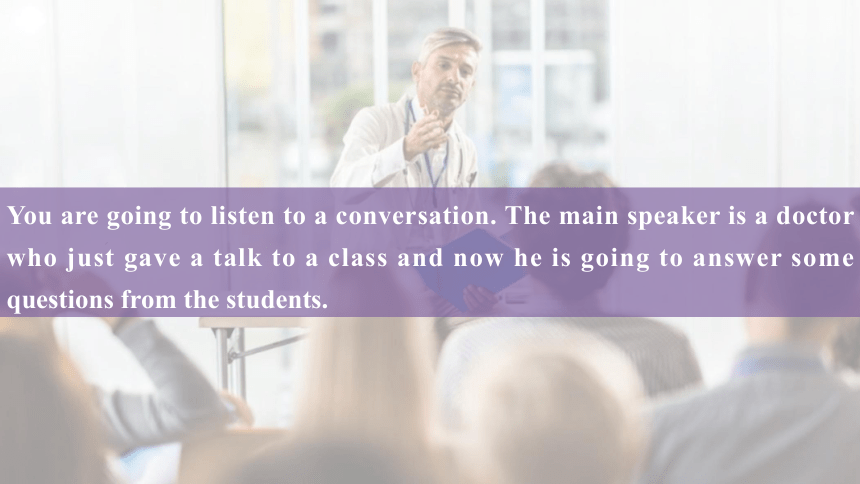
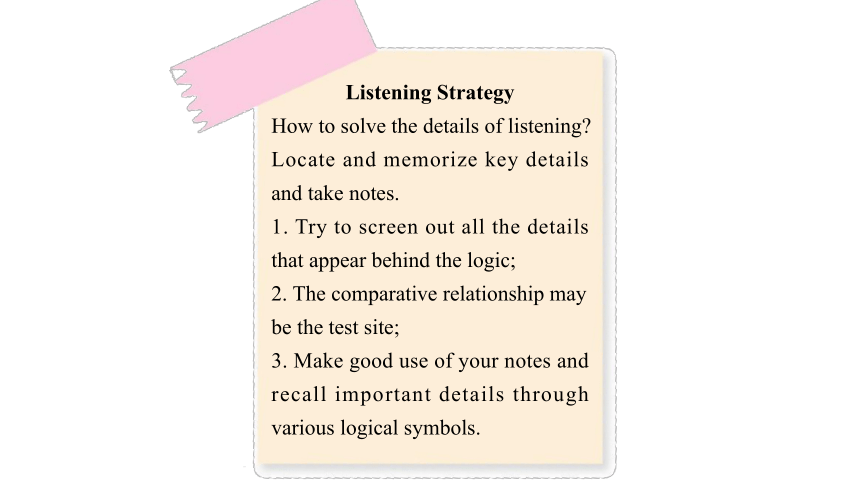
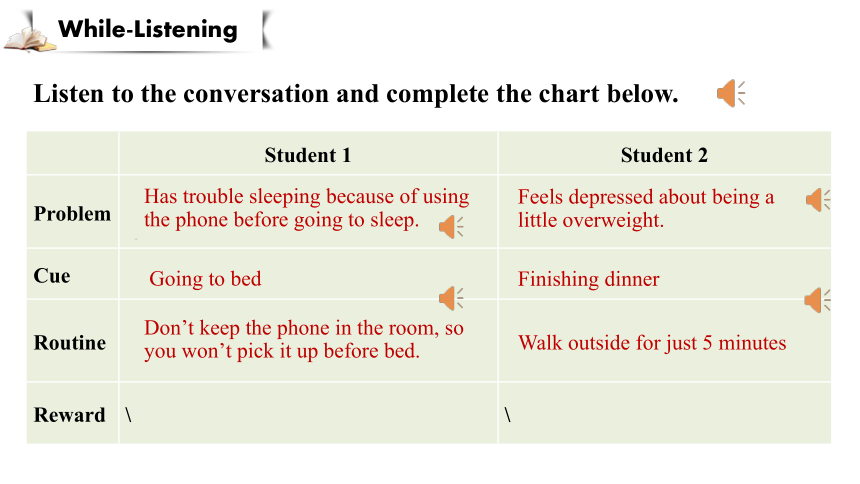
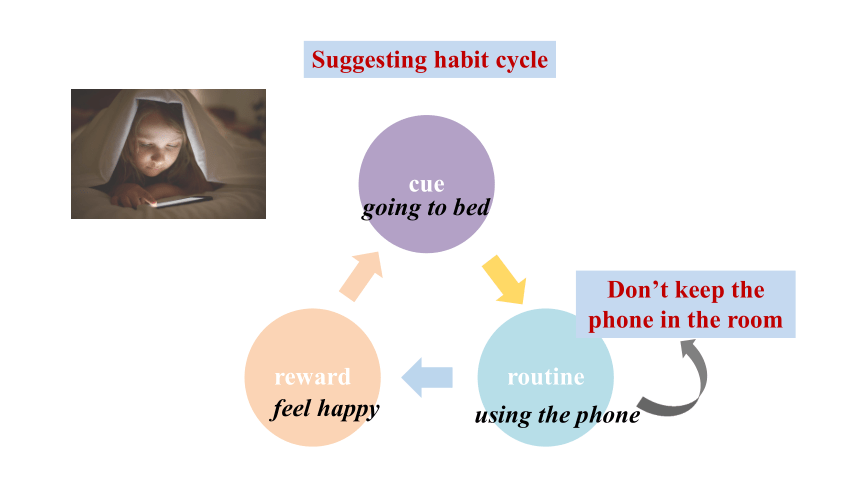
文档简介
(共19张PPT)
Unit 2
Healthy lifestyle
Using Language(1)—Listening and Speaking
By the end of this period, you will be able to:
gain information about two students’ bad habits and doctor’s advice through listening;
distinguish “facts” from “opinions” to understand the context and speakers better;
present a short-play or a conversation to show the bad habits and advice to help get rid of them.
Pre-Listening
Look at each of the pictures and answer the following questions.
1. What’s the person doing
2. What’s his/her problem
3. What’s the possible cause of her bad habit
4. What advice would you suggest to her
You are going to listen to a conversation. The main speaker is a doctor who just gave a talk to a class and now he is going to answer some questions from the students.
Listening Strategy
How to solve the details of listening
Locate and memorize key details and take notes.
1. Try to screen out all the details that appear behind the logic;
2. The comparative relationship may be the test site;
3. Make good use of your notes and recall important details through various logical symbols.
While-Listening
Listen to the conversation and complete the chart below.
Student 1 Student 2
Problem
Cue
Routine
Reward \ \
Has trouble sleeping because of using the phone before going to sleep.
Feels depressed about being a little overweight.
Going to bed
Finishing dinner
Don’t keep the phone in the room, so you won’t pick it up before bed.
Walk outside for just 5 minutes
Old habit cycle
cue
routine
reward
going to bed
using the phone
feel happy
Suggesting habit cycle
Don’t keep the phone in the room
Old habit cycle
cue
routine
reward
finishing the dinner
picking up the phone
feel happy
Suggesting habit cycle
walking outside for 5 minutes
Listen again and answer the questions.
1. Why is a good night’s sleep important for the first student
A good night’s sleep is important because it will help with their schoolwork.
2. Why does the second student never exercise
Because he always picks up his phone instead of exercising.
3. What is the expert’s bad habit
The expert drinks too much coffee.
4. What would you advise the expert to do to control this habit
I would suggest that the expert change the habit slowly by drinking smaller cups of weaker coffee, and then try to change coffee for another drink. Later he should do more exercise as this can stimulate the body like coffee does but has more positive benefits.
Listening text
Teacher: Thank you so much for speaking to the class, Doctor. It was a really interesting talk.
Doctor: That’s very kind of you.
Teacher: Could you answer some questions about habits and lifestyles from the students
Doctor: Sure, I’d love to.
Student 1: Hello. I have trouble sleeping. It often takes me a long time to fall asleep at night. It’s affecting my schoolwork because I’m always tired in the daytime.
Doctor: I see. What do you do just before you go to sleep
Student 1: I usually pick up my phone.
Doctor: Oh,I think the phone could be the problem. It makes your brain more active,which makes it hard to sleep. Your cue is going to bed. The routine is picking up your phone. To change the cycle, don’t keep your phone in your bedroom at night. You’ll find you sleep better, and much easier too!
Student 1: Thanks,Doctor.I’ll give it a try.
Doctor: You’re welcome. Any other problems I can help with
Student 2: Hi. I feel depressed about being a little overweight. I want to exercise every night after dinner, but I always just pick up my phone. What can I do
Doctor: To create a good habit is the same as creating a bad one, but you must take small steps to begin with. So,your cue can still be finishing dinner,but make the routine to turn off your phone and walk outside—for just five minutes. A five-minute walk is so easy. It’s hard to say no! When this has become a habit, walk for longer. Don’t worry about losing weight at first. Focus on the habit of going out and build from there.
Student 2: Thanks for the advice, Doctor. I’ll try it tonight.
Teacher: Well, thank you again for your talk today, Doctor. Now, would you like a cup of coffee
Doctor:That’s very nice of you, but I drink too much coffee.I still have some bad habits, too!
Listening Strategy
Distinguish facts from opinions
It is important to know whether what the speakers say is a fact or an opinion. An opinion is a subjective statement and a fact is objective. A fact is what really is true, while an opinion is what you believe, often using phrases like “I think/believe”, “in my opinion”, “to me”, and so on.
Decide whether these statements from the conversation are facts(F) or opinions(O).
1 _____ It was a really interesting talk.
2 _____ It often takes me half an hour to fall asleep at night.
3 _____ You look tired. Not enough sleep, right
4 _____ It is affecting my school work.
5 _____ I failed in all my school subjects this semester.
6 _____ I usually pick up my phone.
7 _____ I think the phone is the problem.
8 _____ A five-minute walk is so easy that it is hard to say no!
O
F
O
F
F
F
O
O
Choose a bad habit from the table below and have a conversation with your partner about it.
sleeping too much overeating game addict TV addict
Internet addict staying up too late overspending
Post-Listening
Asking for and giving advice
My problem is… I’m having problems with…
I cannot stop… Please give me some advice about…
I think/believe you should… So, why don’t you…
Well, have you thought about… In my opinion, …
Accepting and refusing advice
Sure, I’ll do that.
That’s a good idea!
That’s just what I need!
Lovely!
Great!
Terrific idea!
Sorry, but I…
I’d like/love to…, but…
That’s a good idea, but…
Thank you for telling me, but…
It’s a nice thought, but…
I cannot…. because…
A: I think I’m watching too much TV.
B: Yeah. Me too.
C: In my opinion, you should spend your time on something more active instead. For example, try to get more exercise.
B: OK, sure, I’ll try that.
A: That’s a nice thought, but I don’t really enjoy exercising.
C: Hmm. How about reading more books instead
A: All right, maybe I can try that.
Finish the exercise that is given today.
Homework
Unit 2
Healthy lifestyle
Using Language(1)—Listening and Speaking
By the end of this period, you will be able to:
gain information about two students’ bad habits and doctor’s advice through listening;
distinguish “facts” from “opinions” to understand the context and speakers better;
present a short-play or a conversation to show the bad habits and advice to help get rid of them.
Pre-Listening
Look at each of the pictures and answer the following questions.
1. What’s the person doing
2. What’s his/her problem
3. What’s the possible cause of her bad habit
4. What advice would you suggest to her
You are going to listen to a conversation. The main speaker is a doctor who just gave a talk to a class and now he is going to answer some questions from the students.
Listening Strategy
How to solve the details of listening
Locate and memorize key details and take notes.
1. Try to screen out all the details that appear behind the logic;
2. The comparative relationship may be the test site;
3. Make good use of your notes and recall important details through various logical symbols.
While-Listening
Listen to the conversation and complete the chart below.
Student 1 Student 2
Problem
Cue
Routine
Reward \ \
Has trouble sleeping because of using the phone before going to sleep.
Feels depressed about being a little overweight.
Going to bed
Finishing dinner
Don’t keep the phone in the room, so you won’t pick it up before bed.
Walk outside for just 5 minutes
Old habit cycle
cue
routine
reward
going to bed
using the phone
feel happy
Suggesting habit cycle
Don’t keep the phone in the room
Old habit cycle
cue
routine
reward
finishing the dinner
picking up the phone
feel happy
Suggesting habit cycle
walking outside for 5 minutes
Listen again and answer the questions.
1. Why is a good night’s sleep important for the first student
A good night’s sleep is important because it will help with their schoolwork.
2. Why does the second student never exercise
Because he always picks up his phone instead of exercising.
3. What is the expert’s bad habit
The expert drinks too much coffee.
4. What would you advise the expert to do to control this habit
I would suggest that the expert change the habit slowly by drinking smaller cups of weaker coffee, and then try to change coffee for another drink. Later he should do more exercise as this can stimulate the body like coffee does but has more positive benefits.
Listening text
Teacher: Thank you so much for speaking to the class, Doctor. It was a really interesting talk.
Doctor: That’s very kind of you.
Teacher: Could you answer some questions about habits and lifestyles from the students
Doctor: Sure, I’d love to.
Student 1: Hello. I have trouble sleeping. It often takes me a long time to fall asleep at night. It’s affecting my schoolwork because I’m always tired in the daytime.
Doctor: I see. What do you do just before you go to sleep
Student 1: I usually pick up my phone.
Doctor: Oh,I think the phone could be the problem. It makes your brain more active,which makes it hard to sleep. Your cue is going to bed. The routine is picking up your phone. To change the cycle, don’t keep your phone in your bedroom at night. You’ll find you sleep better, and much easier too!
Student 1: Thanks,Doctor.I’ll give it a try.
Doctor: You’re welcome. Any other problems I can help with
Student 2: Hi. I feel depressed about being a little overweight. I want to exercise every night after dinner, but I always just pick up my phone. What can I do
Doctor: To create a good habit is the same as creating a bad one, but you must take small steps to begin with. So,your cue can still be finishing dinner,but make the routine to turn off your phone and walk outside—for just five minutes. A five-minute walk is so easy. It’s hard to say no! When this has become a habit, walk for longer. Don’t worry about losing weight at first. Focus on the habit of going out and build from there.
Student 2: Thanks for the advice, Doctor. I’ll try it tonight.
Teacher: Well, thank you again for your talk today, Doctor. Now, would you like a cup of coffee
Doctor:That’s very nice of you, but I drink too much coffee.I still have some bad habits, too!
Listening Strategy
Distinguish facts from opinions
It is important to know whether what the speakers say is a fact or an opinion. An opinion is a subjective statement and a fact is objective. A fact is what really is true, while an opinion is what you believe, often using phrases like “I think/believe”, “in my opinion”, “to me”, and so on.
Decide whether these statements from the conversation are facts(F) or opinions(O).
1 _____ It was a really interesting talk.
2 _____ It often takes me half an hour to fall asleep at night.
3 _____ You look tired. Not enough sleep, right
4 _____ It is affecting my school work.
5 _____ I failed in all my school subjects this semester.
6 _____ I usually pick up my phone.
7 _____ I think the phone is the problem.
8 _____ A five-minute walk is so easy that it is hard to say no!
O
F
O
F
F
F
O
O
Choose a bad habit from the table below and have a conversation with your partner about it.
sleeping too much overeating game addict TV addict
Internet addict staying up too late overspending
Post-Listening
Asking for and giving advice
My problem is… I’m having problems with…
I cannot stop… Please give me some advice about…
I think/believe you should… So, why don’t you…
Well, have you thought about… In my opinion, …
Accepting and refusing advice
Sure, I’ll do that.
That’s a good idea!
That’s just what I need!
Lovely!
Great!
Terrific idea!
Sorry, but I…
I’d like/love to…, but…
That’s a good idea, but…
Thank you for telling me, but…
It’s a nice thought, but…
I cannot…. because…
A: I think I’m watching too much TV.
B: Yeah. Me too.
C: In my opinion, you should spend your time on something more active instead. For example, try to get more exercise.
B: OK, sure, I’ll try that.
A: That’s a nice thought, but I don’t really enjoy exercising.
C: Hmm. How about reading more books instead
A: All right, maybe I can try that.
Finish the exercise that is given today.
Homework
